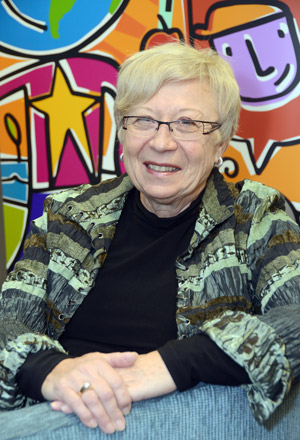Rebuilding education systems require long-lasting strategies, says UBC professor

Annette LaGrange, associate dean in the Faculty of Education at the University of British Columbia’s Okanagan campus, has been instrumental in helping to revamp educational systems in different countries.
It is fine and well to travel to distant lands and help set up educational systems and programs, but if they are not sustainable they are doomed to fail.
So for Annette LaGrange, that long-term sustainability is critical to any program she works on.
LaGrange has been to many regions of the world to help establish educational programs where she discovered the important roles culture and history can play in the classroom and for the ongoing implementation of any new programs.
She joined the Faculty of Education at the University of British Columbia’s Okanagan campus as associate dean in September. Formerly dean of the Faculty of Education at the University of Calgary, LaGrange spent seven years helping rebuild the education system in Kosovo, starting in 1999 after the conflict ended.
“That’s one of the places where you really learn about social sustainability,” she says, adding the key to sustainability was establishing a system that could continue after the international aid was gone.
“It’s trying to figure out what they want and they need instead of imposing our values and education system on them.”
LaGrange finished her work in Kosovo in 2007, and she said overall the program had a powerful impact on the education system, but for a range of reasons there were pockets where the change did not take hold. However, there are areas where the change is very strong and is sustainable.
“Many of the people we worked with have taken on leadership roles,” says LaGrange, adding relationship is vital to long-term success and she and her colleagues remain in close contact with their Kosovo counterparts.
“To keep it sustainable, you must keep those relationships strong.”
LaGrange is also active in Africa, and has applied the same philosophy of sustainability to a completely different culture.
“It really is about understanding what they want. We are there to support their vision,” she says. Once again their culture plays a huge role in how the system is set up and LaGrange says it is important to get to know the people before any programs are introduced to foster long-term success.
Available resources are another factor LaGrange considers when looking at the local education system. There is no point in setting up an Internet-based education system if the people do not have reliable access to the World Wide Web.
LaGrange and fellow UBC Okanagan scholar Susan Crichton are assisting Aga Khan University (AKU) in developing teaching platforms that can reach students in some of the most remote areas on the planet. AKU operates in areas such as in Pakistan, Afghanistan and parts of East Africa where getting an education can be a challenge.
LaGrange is helping to develop curriculum that will be stored on tablet hand-held computers designed by her colleagues that are portable, do not need the Internet to operate and can be run from solar power all of which bodes well for long-term sustainability.
—30—